Ready to unleash innovation together? We’ll show how you can empower everyone in your organization to automate anything, integrate data, and connect applications with MuleSoft. From IT to business teams, discover the tools and strategies to do more with less, deliver seamless customer experiences – all while keeping up with surging demands.

APIs are the connectors that allow applications to talk to each other, and they’re key components for delivering business value. While API management is not new, API needs are rapidly changing. Adoption has exploded since 2020, growing at a rate that far outpaces the ability to manage the landscape of apps and integrations. APIs were adopted by a whopping 61% increase from 2019 to 2020. That’s because APIs support a variety of demands requiring organizations to innovate, and innovate fast. This includes:
- Connected experiences
- Legacy modernization
- Parallel development efforts and multi-cloud environments
- Strategic growth initiatives and new revenue models
Business leaders can meet these demands by building the composable enterprise: a lightweight, agile, modular model made up of both teams and technologies. Yet, even the most ambitious, tech-led organizations encounter a tipping point as APIs multiply across their roadmaps.
API sprawl is a significant challenge for innovation, especially as technologies are adopted across distributed deployments throughout the enterprise. Visibility and usability are limited by fragmentation. Ultimately, teams get stretched thin trying to operate and administer across too many environments. IT and Ops teams may start to adopt their own processes and architectures to deliver capabilities faster but API governance expands in complexity. Governance and security become unstable. Things break, everyone suffers, and this leads to customer and employee churn.
When this is the reality, a composable enterprise feels simply unattainable.

How can execs get ahead before chaos ensues?
MuleSoft is pioneering a new API management category: Universal. The collection of capabilities defining Universal API management (UAPIM) allows users to accelerate application delivery and implement modern architectures while maintaining consistent security and quality.
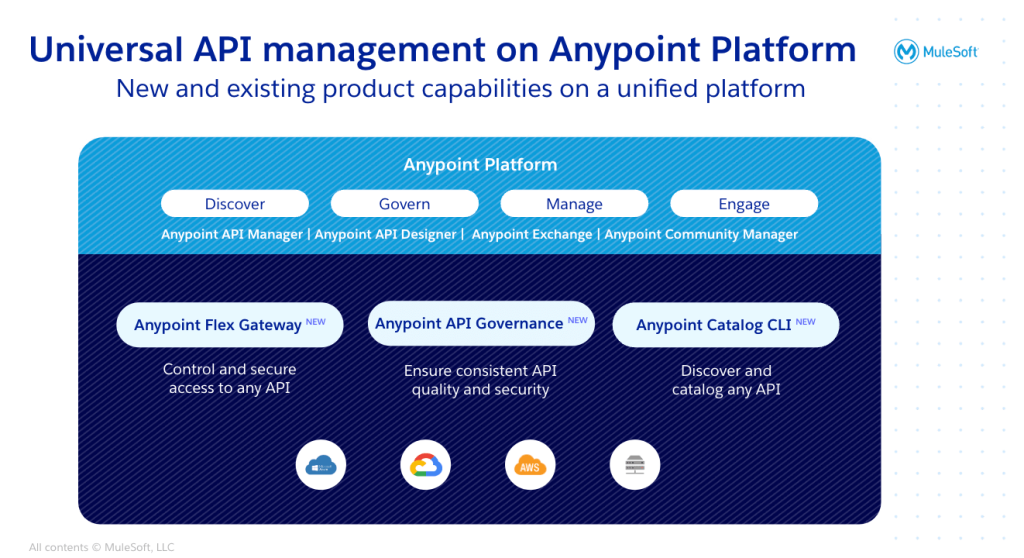
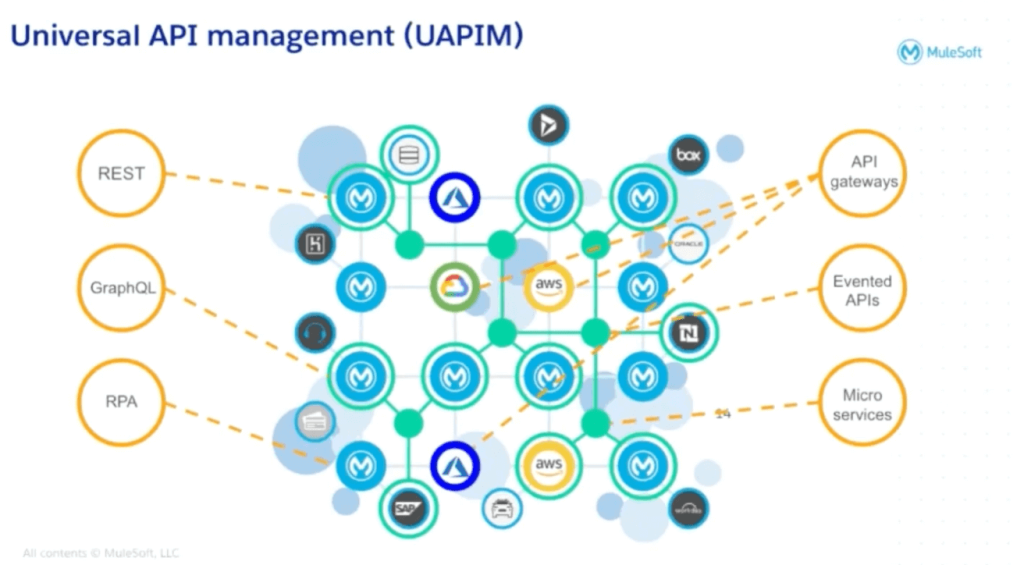
UAPIM is not an individual product; it’s a constellation of new and existing products that enable customers to manage and secure any API no matter their origin, architecture, or environment. UAPIM includes following products on a unified platform:
- Anypoint DataGraph
- Anypoint Flex Gateway
- Anypoint API Governance
- Anypoint API Manager
- Anypoint Exchange
- API Community Manager
Whether you are standing up new business models or looking to open up new revenue streams, UAPIM helps teams realize the full value of existing infrastructure and accelerate the delivery of the apps driving innovative initiatives. Teams can implement modern architectures to get consistency, security, and quality across multi-cloud environments for a more vibrant ecosystem.

3 examples how Universal API Management works in the real world
We’ve compiled three helpful examples on how Universal API Management actually works – something you can see and put to use yourself.
1. How UAPIM helps build composable businesses
For a high-level overview of how UAPIM can help you build a composable business and close the delivery gap, watch this short video with MuleSoft Director of Product Marketing Sameer Parulkar and JPAC Field CTO of Digital Transformation Andrew Dent. They demonstrate how the composable enterprise allows teams to accelerate delivery up to three times faster with MuleSoft’s Anypoint Platform.
“MuleSoft’s Annual Connectivity Report shows only 37% of organizations say they have the technology and skills to keep pace with demands, and it’s causing a delivery gap that only seems to be increasing.”
– Sameer Parulkar
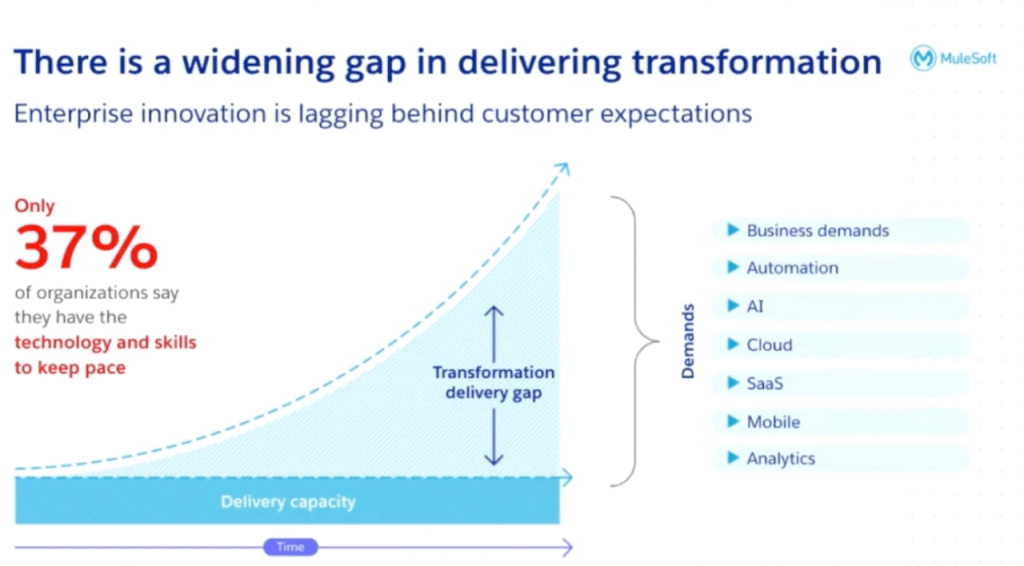
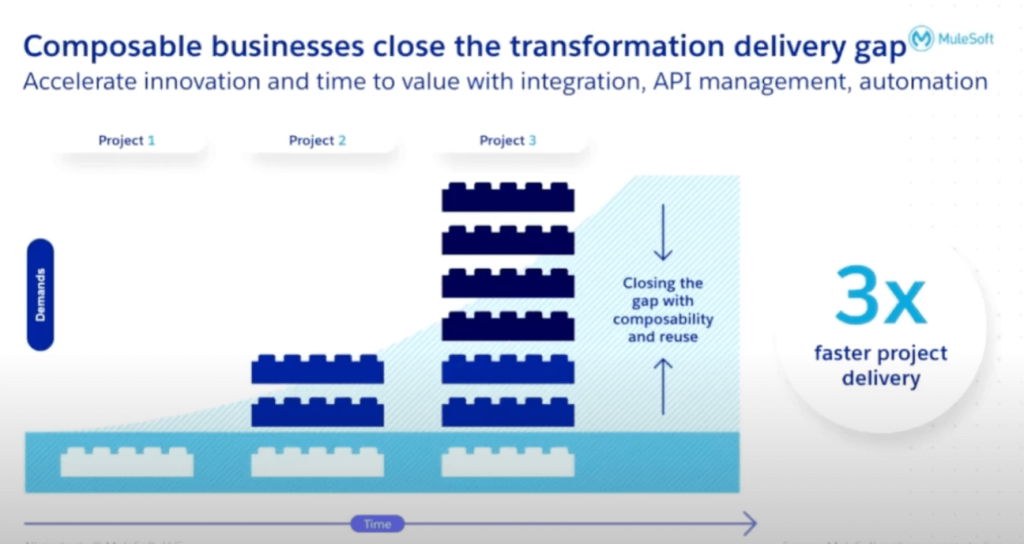
2. How composability defines connected wellness in healthcare
Then, get a play-by-play on how composability is defining the future of connected wellness in healthcare with UCSF’s Associate Director for Integrations and Data Warehouse Platforms, Victor Galvez. He explains how UCSF built and powered their first connected patient referral application with data from MuleSoft on the Salesforce platform. UCSF now processes over 400,000 referrals per year, eliminating error-prone manual processes and snail-paced modes of capturing data including mail-in forms and fax.
Because of our need and want to connect with our patients when they need us, these types of connections and applications cut down on wait times and provide better care.
3. How APIs, analytics, and automation inform data-driven decisions
Finally, get technical with MuleSoft Global Product Marketing Lead, Linda Su, as she provides a detailed use case scenario for how MuleSoft and Tableau are powering APIs, analytics, and automation to inform data-driven decision-making in the public sector.
“MuleSoft makes it easy to unlock the data and access information in real-time, securely with clicks–not code.”
– Linda Su
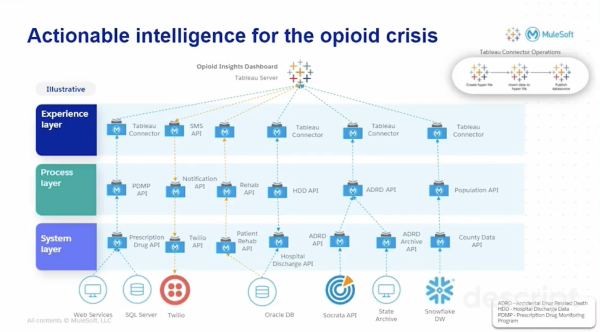
Next steps
Accelerating delivery is a huge step toward achieving a composable business and Universal API Management is the key to rapid application delivery, implementation and innovation of modern architectures, and consistent security and quality. Contact your account executive or account development representative and get your copy of the CIO Guide to Universal API Management.









